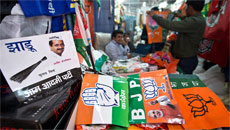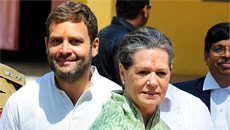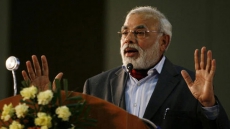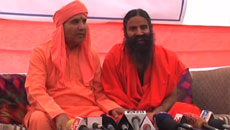He was once considered the IT czar and the Bill Gates of Andhra Pradesh, who founded and built Satyam into one of the top IT companies in India.
B. Ramalinga Raju even shared the dais with Bill Clinton when the then US president visited Hyderabad in 2000.
A special CBI court on Thursday sentenced Ramalinga Raju, his two brothers and seven others to seven years in prison in what is described by the Central Bureau of Investigation as the biggest corporate fraud in India's history.
The 60-year-old Raju, who already spent 32 months in jail before he was granted bail in 2011, has returned to prison.
It was in 2009 that this poster boy of India's IT industry had a dramatic fall when he resigned as chairman of Satyam Computer Services Ltd. while admitting that the company's account books and profits were inflated over many years.
He was arrested and sent to jail.
From the cosy environs of his posh bungalows and state-of-the-art offices to the claustrophobic confines of Chanchalguda jail in Hyderabad, life suddenly took a cruel turn for him.
The son of an agriculturist and hailing from West Godavari district in coastal Andhra Pradesh, he launched business in textile weaving and construction in 1977.
He had no engineering background but his brother-in-law D.V.S. Raju, an engineer, inspired him to enter the IT sector by setting up Satyam Computer Services in 1987.
Proving his entrepreneurial skills, Raju built Satyam into a IT bellwether.
One of the pioneers of offshoring, it started remotely delivering IT services to some clients in the US in 1991.
The success with offshoring was followed by the Y2K boom, which catapulted Satyam to the top league.
Satyam ventured into the internet business through Satyam Infoway in 1988. After surviving the dotcom bust, it started concentrating on software services.
In the mid 1990s when Hyderabad was emerging on the world IT map, Satyam was the biggest name and it was no wonder that he shared the dais with the likes of Bill Clinton.
Raju was also well respected for his involvement in corporate social responsibility.

Byrraju Foundation and the Satyam Foundation earned him reputation through various projects, especially the 108 medical emergency services in Andhra Pradesh and other states.
Raju also had a long list of awards, including the E&Y Entrepreneur of the Year Services award 1999, the Dataquest IT Man of the Year Award 2000, the Asia Business Leader Award 2002, and the Golden Peacock Award for Corporate Governance.
Satyam was listed on the New York Stock Exchange in 2001 and the revenues exceeded $1 billion in 2006 and $2 billion mark in 2008.
It remained the fourth largest IT services firm for a long time with operations through the parent company and subsidiaries in as many as 65 countries.
A few weeks before the scam came to light, it had reported annual revenues of $2.4 billion and a total employee size of 53,000.
The trouble for Satyam began in December 2008 when it announced plans to buy two Maytas firms owned by Raju's sons. He had to call off the deal within hours due to opposition by the shareholders. The share price started tumbling.
The same month World Bank blacklisted Satyam for eight years on grounds of data theft and bribing bank officials.
After the scam, Tech Mahindra took over Satyam Computers in a government-sponsored auction and the new entity was named Mahindra Satyam.
The Satyam brand became history in 2013 with the merger of Mahindra Satyam with Tech Mahindra.





